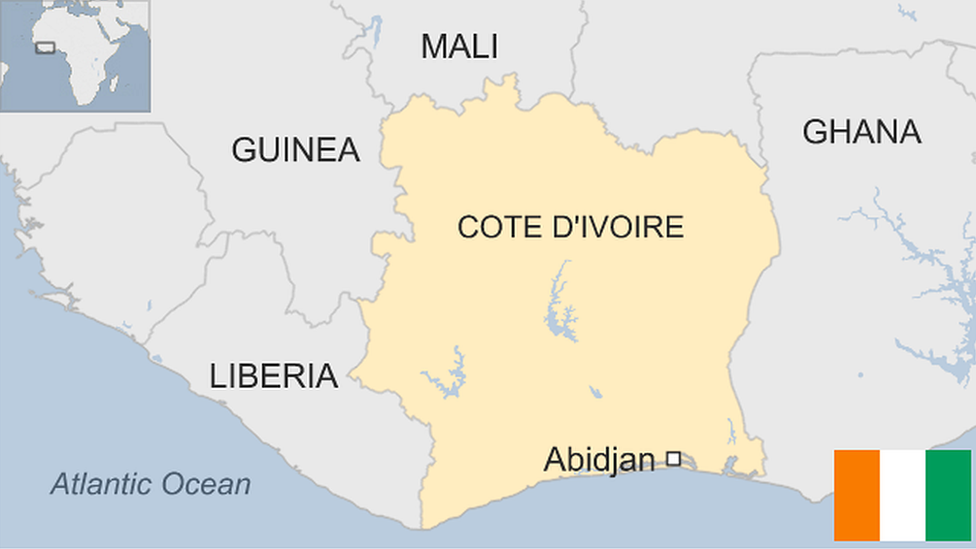Old men, chocolate and Ivory Coast's bitter election
- Published
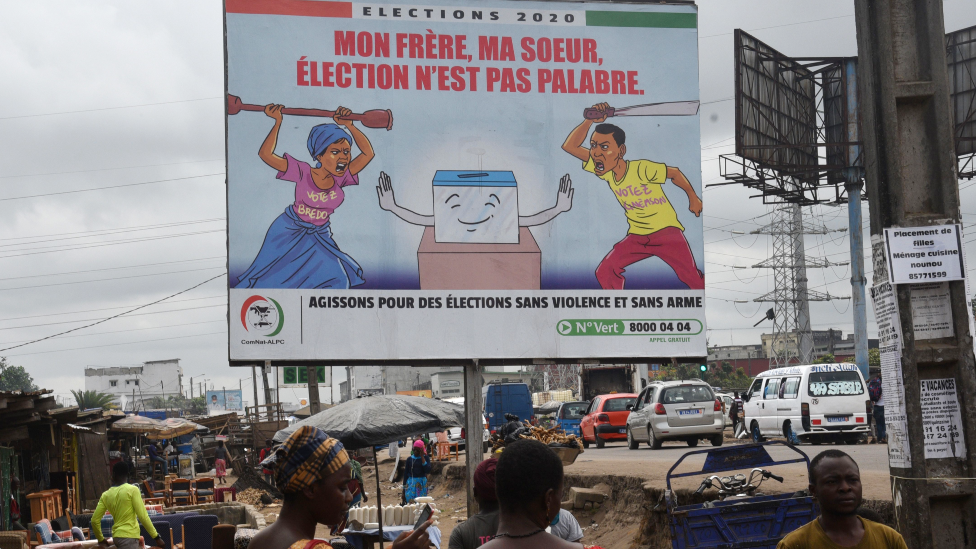
Much of the world's chocolate is made thanks to the cocoa grown in Ivory Coast, where an election has opened up bitter wounds, writes James Copnall, a former BBC correspondent in the country.

A political quarrel between three, now old, men has monopolised political life in Ivory Coast for over a quarter of a century.
It has led to civil wars and coups, and almost derailed a country, which likes to see itself as a shining example for West Africa and beyond.
Mr Ouattara, known to his supporters by his initials "Ado", is not just running again - he is the favourite to win"

Ivorians go back to the polls on Saturday with the three giants of politics - Alassane Ouattara, 78, Laurent Gbagbo, 75, and Henri Konan Bédié, 86 - still looming large, even if their fortunes have dramatically shifted over the last few years.
And - as so often when elections roll round in Ivory Coast - tensions are extremely high.
It was meant to be an election too far for President Ouattara, who has been in power since 2011.
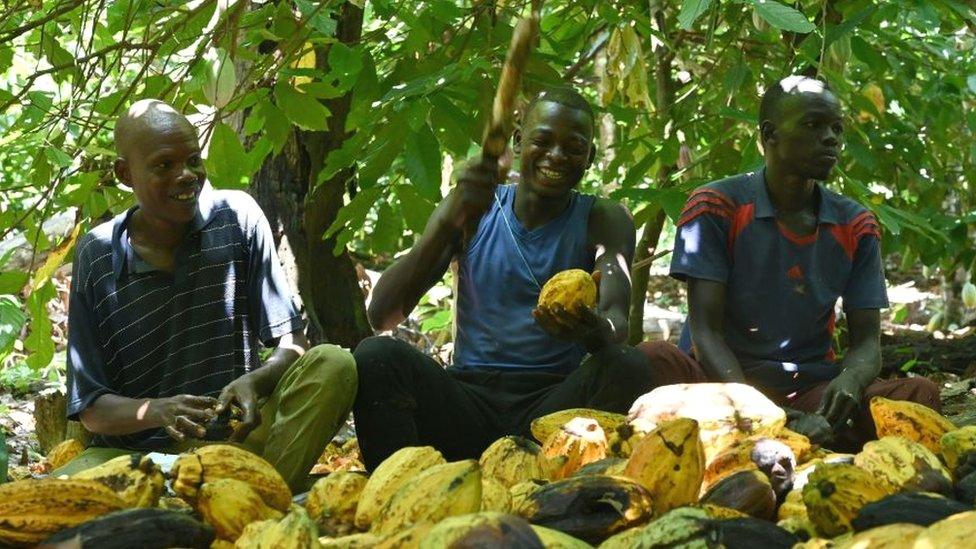
Ivory Coast is the largest producer of cocoa, the main ingredient for chocolate
The opposition insist he has served the maximum two terms allowed by the constitution.
Even Mr Ouattara himself said earlier this year that he would not run. He rejected the charge that standing again would be unconstitutional - but announced it was time to make way for a younger generation.
And yet Mr Ouattara, known to his supporters by his initials "Ado", is not just running again - he is the favourite to win.
So what has changed in the last few months, and why are tensions so high?
Third term U-turn
First, the candidate of Mr Ouattara's RHDP party, Amadou Gon Coulibaly, a close confident and protégé of the president, died unexpectedly in July, aged 61, after travelling to France to have a stent fitted.
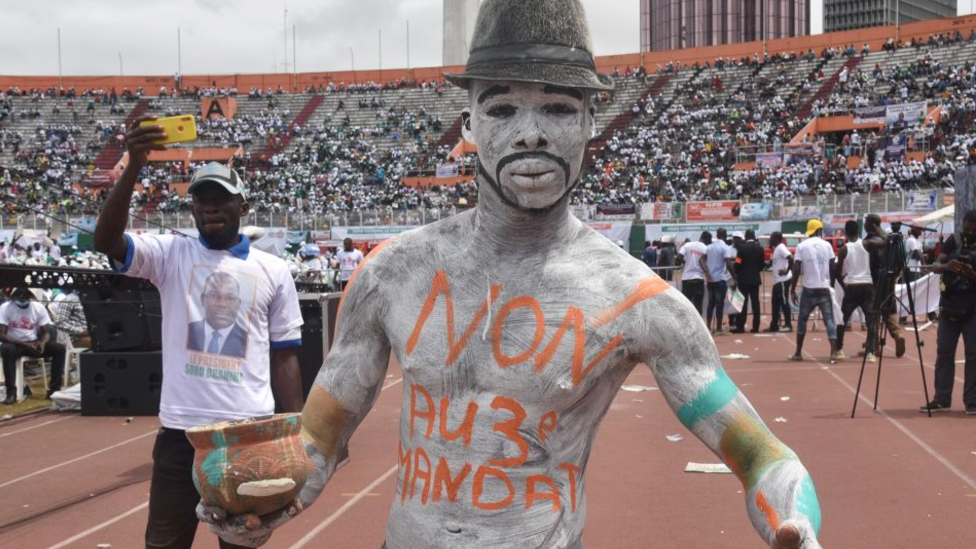
Opposition supporters believe President Ouattara's third term bid is unconstitutional
After that Mr Ouattara went back on his commitment to step away from the front rank of political life.
He was apparently responding to the desires of his party, who believe he is their best chance of conserving power.
Mr Ouattara's supporters say the two-term limit was reset when a new constitution was brought in in 2016.
Alpha Condé used a similar argument in neighbouring Guinea, and won another term in controversial elections earlier this month.
In Ivory Coast, the electoral commission accepted Mr Ouattara's candidacy.
Two rivals disqualified
And so Mr Ouattara was free to continue his decades-long political battle with two former presidents, Mr Bédié and Mr Gbagbo, whose refusal to concede defeat to Mr Ouattara in the 2010 election sparked a bitter civil war.
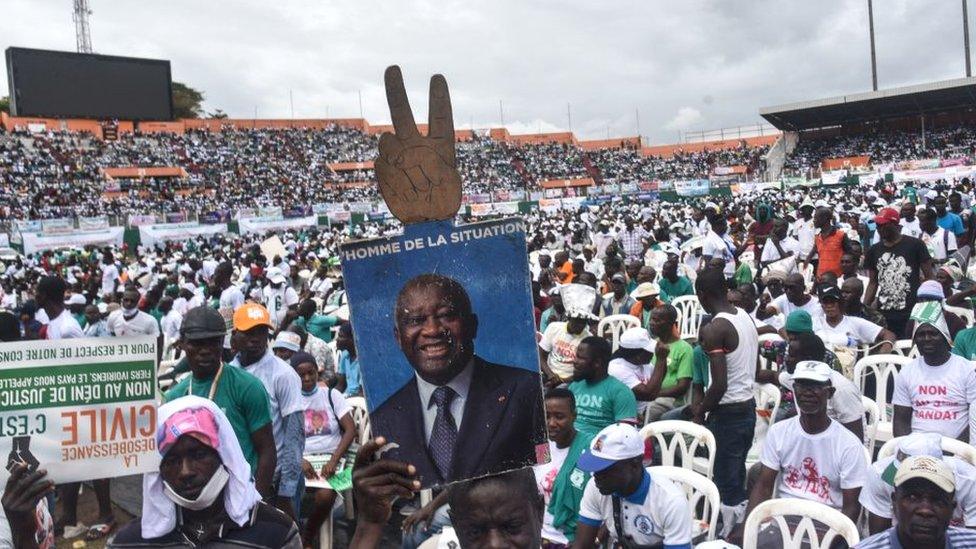
Mr Gbagbo, who is living in exile, put his name forward as a way to rally his supporters
But not for the first time in Ivorian politics, there was a twist. Mr Gbagbo was one of nearly 40 potential candidates who was turned down by the electoral commission.
He is still in Europe, waiting for an appeal into the decision by the International Criminal Court (ICC) to acquit him on charges of crimes against humanity in the violence that followed the 2010 election.
Another prominent politician, Guillaume Soro, who led the New Forces rebels backing Mr Ouattara who defeated Mr Gbagbo militarily in the end, has also not been allowed to stand.
Both Mr Gbagbo and Mr Soro were blocked because they have been convicted by Ivorian courts.

You may also be interested in:
'We have no choice', says one cocoa smuggler

The irony was not lost in Ivory Coast: Mr Ouattara was famously not allowed to run in 2000, with opponents casting doubt on whether he was really Ivorian, and much of the early years of his political life were spent struggling to get on the ballot.
Now, his political retirement seems to have been put on hold, and it's the turn of some of his most significant opponents to be excluded from the race.
Mr Ouattara's camp insists the electoral commission and the courts are independent - but the opposition bitterly disputes this.
Civil unrest
Mr Bédié has been allowed to stand.
Yet he and Pascal Affi Nguessan, a former prime minister from a faction of Mr Gbagbo's FPI party, insist the vote will not be free and fair, and have called on their supporters to carry out a campaign of "civil disobedience".
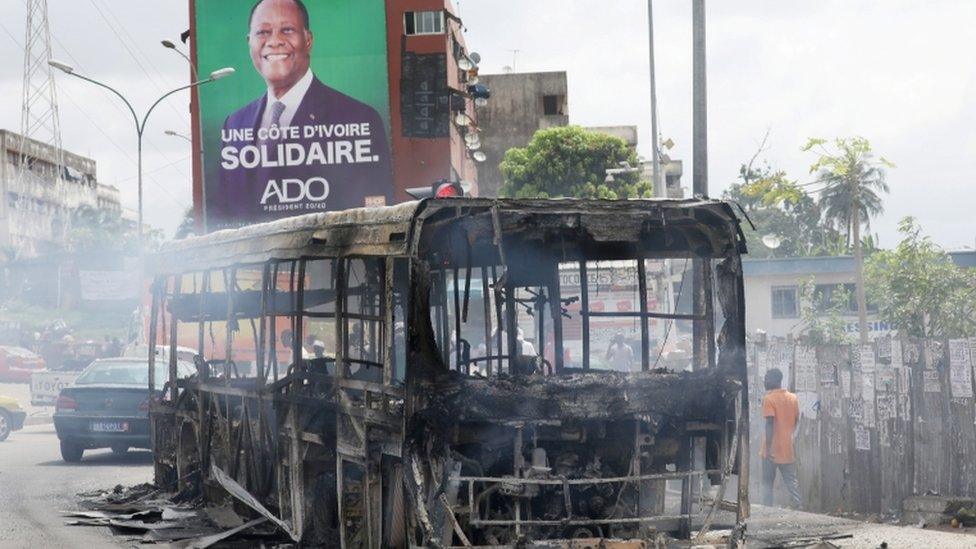
There are fears that the election could reignite conflict nearly 10 years after post-poll violence killed more than 3,000 people
Already several people have died in protests against Mr Ouattara's third term.
"There were reasons to expect tensions even without the decision of Mr Ouattara to go for a third term, like the controversy over the electoral commission," says Gilles Yabi, who runs the West African citizen think-tank Wathi.
"But Mr Ouattara's decision is the most important trigger for the level of tension we have now."
Foreign diplomats and regional bodies and Ivorian rights groups have all called for calm.
Will history repeat itself?
The country's worst nightmare is a rerun of the 2010 election, and the devastating war that followed.
History rarely repeats itself exactly though.

Three main contenders:
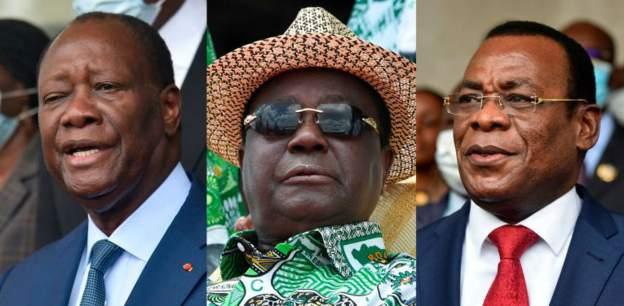
Alassane Ouattara (L): 78, an economist. Became president in 2011, serving his second term after years in opposition. Party: Rally of Houphouëtists for Democracy and Peace (RHDP)
Henri Konan Bédié (C): 86, career politician. Served as president between 1993 and 1999, deposed in coup. Party: Democratic Party of Ivory Coast (PCDI)
Pascal Affi Nguessan (R): 67, career politician. Served as prime minister between 2000 and 2003 under then-President Laurent Gbagbo. Party: Ivorian Popular Front (FPI) faction

Many Ivorians make the point that there is no appetite for conflict - that too many suffered in the terrible years between the coup against Mr Bédié in 1999 and Mr Ouattara's inauguration in 2011.
The president is campaigning on his economic record, with genuinely impressive growth numbers - the country is an agricultural powerhouse and has had an average yearly growth of 8% since 2011.

Most Ivorians make a living in the informal economy
Cocoa is vital to the economy - around 600,000 farmers work in the sector, which accounts for about 40% of export revenues.
Just ahead of the vote, they received the welcome news that the minimum cocoa price was being raised by 21% - meaning they will get $1.80 (£1.40) for each kg of cocoa this coming season.
But cocoa is not the only string to Ivory Coast's bow. Cashew nuts, rubber, palm oil and coffee are also major exports.
Yet the World Bank estimates that nearly half of the population still live in poverty - with 80% of the economy being informal.
Improvements have been heavily concentrated in the biggest city, Abidjan, and many feel no better off now than they were a decade ago.
While the president has been holding rallies up and down the country, Mr Bédié and Mr Nguessan have not - as they reject what they see as a fatally flawed electoral process.
It is still not clear if they will ask their supporters to vote after all - or even push them to try to interfere with the election.
The fourth authorised candidate, Kouadio Konan Bertin, known as "KKB", is not a major national figure in the way that Mr Ouattara, Mr Bédié and Mr Gbagbo are.
And so once again millions of Ivorians are waiting nervously to see if this election will end that decades-long quarrel between the big three once and for all - or spark it into renewed, destructive life again.
- Published24 July 2023
